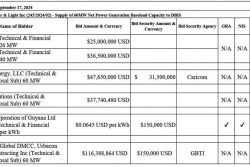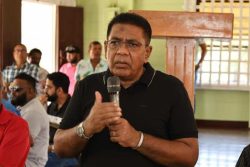Human rights activists from the islands of Bonaire and Sint Eustatius, both special municipalities of the Netherlands, are in Guyana to raise awareness over what they say is growing repression in both territories.
According to Davika Bissessar, President of the We Dare to Care Foundation, the groups have met with Foreign Affairs Minister Carl Greenidge and Ambassador Colin Granderson, Assistant Secretary-General, Directorate for Foreign and Community Relations at Caricom, and their concerns were raised. They have also travelled to other Caribbean nations where they have briefed officials on their problems.
At a press briefing held on Monday at the Red Thread office, Bissessar said the groups hope to expose what they described as the “blatant violations of human rights, the continued colonial administration, the coidentity and culture of the local people by the Dutch government in The Hague….” and seek solidarity in condemnation of the situation.
According to Bissessar, for the past five years they have been fighting brutal rules and laws, which have been forced upon their nations by the Netherlands.
Bissessar asserted that Dutch nationals, who were at one time subjected to certain immigration regulations, now arrive by the hundreds daily and are given free entry to the islands, where they are taking away jobs from the locals.
She added that while Bonaire is supposed to have its own identity, Holland has now subjected it to its laws. They are fearful since in 90 days the Dutch living on the islands may be able to vote and because they now outnumber the locals they can replace local representatives on bodies.
Also at the briefing was James Finies, President, Foundation Nos ke Boneiru Bek (we want Bonaire back), who said every action taken by officials on the island now has to be authorised by the Dutch. He stressed that their campaign is not about politics but rather about the human rights of their people. While the locals number just about 13,000, he said Dutch nationals continue to flood the island and can seemingly do whatever they want. He added that because of the lack of jobs, the locals survive primarily on fishing and farming.
It was also contended that the economy of Bonaire is largely in the hands of the Dutch, but despite documentation by independent organisations that the minimum wage is too low and the average income is well-below the poverty level, the Dutch Government has not acted.
A prepared statement read by Koert Kerkhoff, of the Brighter Path Foundation and a member of the former coalition government in Sint Eustatius, said that the island’s troubles began in October, 2010, when the Dutch Caribbean was forced in a subordinate direct relationship with the Netherlands upon the dissolution of The Netherlands Antilles.
“Since October 10th, 2010, the Dutch government has continued pursuing an aggressive colonial policy of imposing laws contrary to local customs and cultural transitions, undermining and limiting the responsibilities of local democratically elected parliaments and governments, and appointing European Dutch citizens in the local administration and demoting local heads of department,” the statement said.
On February 7th, 2018, following a vote in the Netherlands Parliament, the legislative and executive branches of government of St Eustatius were thrown out and replaced by a sole Dutch government commission, appointed by and accountable to the Dutch minister of the Interior in The Hague and elections due March next year were postponed indefinitely. The decision followed a report by a special committee that found that there was a “gross neglect of duties” by the administration of the island.
The activists said they hoped that the Caribbean countries will help the two islands in their struggle towards acquiring some measure of self-governance.





